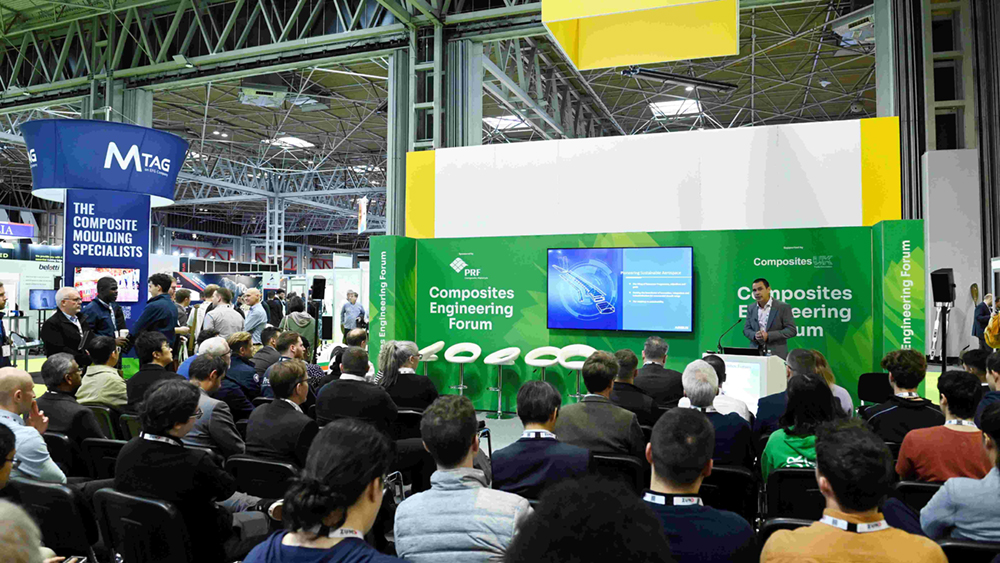Rethink, reduce, remake, recycle and recover is the five R strategy. Here, emphasis is on sustainability in manufacturing by ‘rethinking’ product use through models like leasing, then ‘reducing’ material and energy consumption during design. It also promotes ‘remaking’ products for easy repair and refurbishment, prioritises ‘recycling’ by selecting recyclable materials and, finally, focuses on ‘recovering’ energy from products at the end of their life cycle. Here Simon Farnfield, event director at Advanced Engineering, explains how the industry is adopting this approach for a more sustainable future, while detailing the latest methods being used in the fourth stage of the five R strategy — recycling.
As environmental concerns grow, companies across various industries are setting ambitious sustainability goals to reduce their environmental footprint. Even in the academia arena, efforts are being made to integrate climate action into educational programmes.
For example, École Polytechnique is expanding its commitment to sustainability by introducing a new course as part of its Climate Plan, commencing in the 2024 academic year. The course, titled “Engineering Sustainability, Engineering for the Long Haul,” is led by Céline Guivarch, an economist and climate change expert at École des Ponts, who also contributes to the Intergovernmental Panel on Climate Change (IPCC).
The course provides students with a comprehensive understanding of the major sustainability challenges facing the world today and equips them with the necessary knowledge and skills to address these challenges effectively in industry.
This comes at a time when companies are rethinking their existing processes. Whether it’s the way products are manufactured or how components can be reused, several innovations are being made to ensure sustainable engineering.
Role of AI
Advancements in AI is enhancing the decision-making abilities of robots and opening up new opportunities for companies to improve the sustainability of their operations. For instance, FPD Recycling, an Irish technology start-up, has developed a solution to address the growing issue of electronic waste, particularly from flat panel displays (FPDs) like TVs, monitors and laptops.
Every year, around 50 million tonnes of e-waste is discarded globally, including valuable materials such as gold, silver and copper. Recovering these materials is crucial, as it reduces the need for mining new resources, many of which are becoming increasingly scarce. However, e-waste often contains toxic chemicals like mercury and lead, making safe recovery challenging.
To tackle this, FPD Recycling has introduced the UK’s first fully automated robotic system designed specifically for processing and recycling complex and potentially hazardous e-waste. Two ABB robots are used to process up to 120 screens per hour when operating at full capacity, in an AI-driven compact system that fits into a 40-foot container and consists of two machines that can work independently or together to handle different types of devices.
The recycling process involves three stages. First, each device is weighed and identified, with data such as its technology type being collected. Next, a robot arm scans the screen, determines the appropriate processing method and removes the liquid crystal display (LCD) screen. This careful removal ensures that valuable materials are extracted and hazardous substances are safely handled, leaving a clean waste stream for further processing.
An additional advantage of this system is its ability to gather detailed data on every device processed, including information on weight, size, manufacturer and model. This data collection is crucial for compliance with the EU’s WEEE (Waste Electrical and Electronic Equipment) regulation, which requires manufacturers to pay producer responsibility fees.
By providing comprehensive data, the system helps manufacturers, regulators and compliance organisations track what is being recycled and improve overall recycling rates.
Revolutionising plastic recycling
Traditionally, many plastics deemed non-recyclable — such as flexible multi-layered plastics and ready meal trays — were destined for landfills, incineration or environmental leakage. However, Mura Technology’s multi million-pound facility in Teesside, North East England, is demonstrating that these plastics can be effectively recycled.
The facility serves as the first Hydrothermal Plastic Recycling System (HydroPRS), which converts waste plastics into virgin-grade recycled hydrocarbons. In turn, it aims to create a circular economy for plastics while significantly reducing carbon emissions associated with traditional plastic waste management methods.
The HydroPRS process involves several steps. First, plastics are shredded and contaminants like metals and glass are removed for standard recycling. The remaining plastics are then pressurised and heated before being sent to the HydroPRS reactor, where they are mixed with supercritical steam. This process breaks down the plastics into their component molecules, enabling their reuse in new plastic production.
A key advantage of the HydroPRS technology is its use of water as a solvent under high pressure and temperature to convert solid plastics back into liquid oils and hydrocarbons, the original materials used to make them. This allows for indefinite recycling of plastics without degradation of quality, creating a sustainable loop for plastic materials.
Mura’s plant is projected to produce 20,000 tonnes of recycled hydrocarbons annually, with plans for future expansion.
Sustainable innovations on show
The upcoming Advanced Engineering trade show in October will feature a range of sustainable engineering innovations, reflecting the industry’s growing focus on eco-friendly practices. Exhibitors will showcase technologies and solutions aimed at reducing environmental impact, such as advancements in sustainable materials, energy-efficient systems and methods for promoting a circular economy.
In line with this commitment, the show itself will adopt sustainable practices, including the use of recyclable materials for booths and signage, waste reduction strategies and digital communications to minimise paper use. This approach highlights the importance of integrating sustainability not just in engineering innovations, but also in the events that bring industry professionals together.
The event is returning to the NEC, Birmingham, on October 30 and 31, 2024, so register online today at www.advancedengineeringuk.com.
